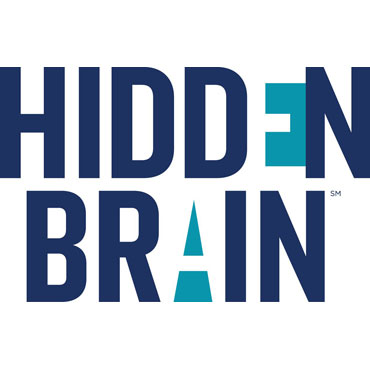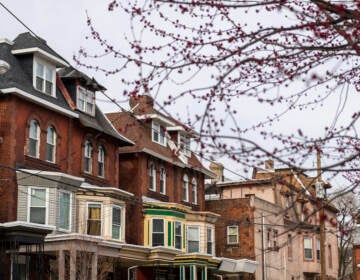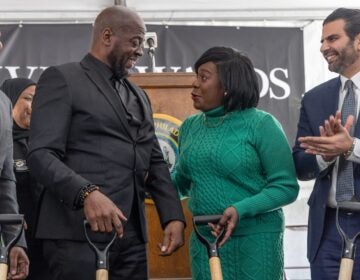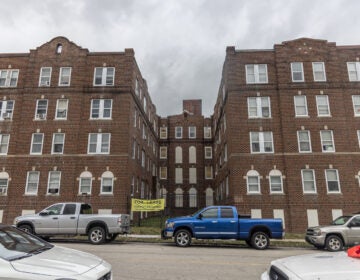City Council set to release sweeping new affordable housing bills
Philadelphia City Council is expected to announce on Wednesday an ambitious package of affordable housing bills — including a new tax on construction.
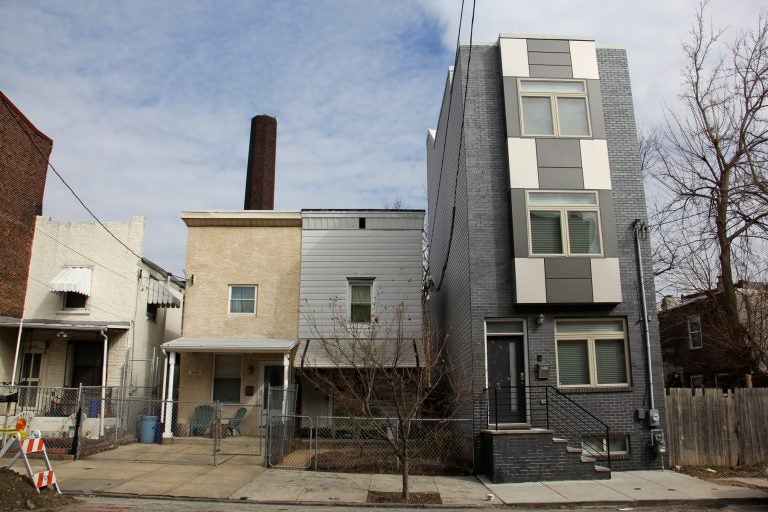
On York Street in East Kensington, a rowhome towers above its neighbors. (Emma Lee/WHYY)
Philadelphia City Council announced on Wednesday — the 50th anniversary of the Fair Housing Act — an ambitious package of affordable housing bills — including a new tax on construction. The legislation represents the culmination of months of debate over inclusionary zoning and the city’s ten-year tax abatement, a development incentive that many progressive members of City Council would like to see reformed.
The bills include a “construction impact tax,” championed by City Council President Darrell Clarke, which would levy a one percent tax on all new construction.
Councilwoman Maria Quiñones-Sanchez, who began pushing for mandatory inclusionary zoning last June, introduced an accompanying raft of new inclusionary zoning bonuses that would allow developers in many zoning districts to build denser and taller buildings if they provide affordable housing.
“The fact that the months of public discussion have gotten us to a place where everyone understands that something has to be done,” said Quiñones-Sanchez. “And a multitude of things need to happen at the same time.”
Clarke’s office did not respond to requests for comment.
Clarke announced the legislative package at a press conference on Wednesday, flanked by fellow members of council who support the measures, including Quiñones-Sanchez and Mark Squilla. Representatives from affordable housing organizations and residential real estate developers were also in attendance.
The heart of Quiñones-Sanchez’s old bill, mandatory inclusionary zoning, was abandoned. But her old opponent, Leo Addimando of Building Industry Association (BIA) attended the press conference alongside her and Clarke. He said that his business group — which represents residential developers — will be supporting the new package.
“We support the amendments to Councilwoman Sanchez’ Mixed-Income Housing Bill because they create real economic incentives for developers to build mixed-income housing. And the one percent Construction Impact Tax will fund the development of this housing by both for-profit and not-for-profit developers and add another level of benefit to the City by making the already successful 10-year tax abatement program a funding source for affordable housing,” said Addimando, BIA vice president, on Wednesday.
The one percent tax will be levied on the estimated cost of construction and will be due at the time the building permit is issued. That includes rehabilitation and repair work, with the exception of “ordinary upkeep and maintenance.” (There is a risk that developers will underestimate their costs, but to secure financing the numbers can’t be too far off from the actuality.)
The bill would also segment the Housing Trust Fund into two separate “sub-funds,” one for the current revenue stream from a fee assessed on deeds and mortgages and one for the proceeds from the proposed construction tax.
The sub-fund backed by the new funding stream will be earmarked for homeownership and rental housing for those at 120 percent of area median income (AMI) or less. (That means households with an income of about $105,000 or less.) The bill does not specify how the funds would be split between affordable housing production and a new down-payment assistance program, to bolster homeownership in the city.
Based on an analysis of the last 10 years of building permits, it is projected that the tax would bring in an average of $25 million a year. The Housing Trust Fund currently brings in $13.5 million from fees levied on mortgages and deeds recorded in Philadelphia. That funding stream goes to projects serving those at 30 percent of AMI (a median income of just over $26,000) and to a lesser extent households between 30 and 115 percent of AMI.
“The coalition has worked really hard to make sure there is development without displacement,” said Nora Lichtash, executive director of the Women’s Community Revitalization Project, a group that has pushed a construction tax for years. “And we think this is a really big step towards that. We are fully in support.”
The new bills are much more favorable to the BIA then Quiñones-Sanchez’s original legislation would have been. In both versions of the previous bill, residential developers would have been the only target. In the new legislation, the construction tax will be broadly shared across the building industries. More expensive luxury development, and larger projects more generally, will obviously also be paying out the most money.
Developer groups outside the BIA are more skeptical of the bills. A recent meeting of the real estate industry trade groups was split on the issue, with many members surprised to hear of the incoming legislation.
“I don’t want to see them do away with the 10-year tax abatement and the talk is this is an alternative to that,” said Harvey Spear, president of Homeowners Association of Philadelphia, a trade group for property owners. “What we don’t like is seeing a tax on renovation, which could prevent a lot of our lower-income landlord from doing repairs.”
The funding stream created by proceeds from the tax can be tapped by for-profit and nonprofit developers alike unlike the original Housing Trust Fund. The BIA had long pushed for an expansion of the voluntary inclusionary zoning bonus, instead of a mandatory requirement, and that’s what wound up in the new legislative package.
But Quiñones-Sanchez’s aspect of the package is quite dramatic in its own way. The city currently has an inclusionary zoning bonus, but it is only usable in the highest density zoning categories, RMX-3, CMX-3, CMX-4, and CMX-5. Only two developers have made use of it and one decided against building affordable housing on-site at the last minute, paying into the Housing Trust Fund instead.
The revised version of Quiñones-Sanchez’s bill would give builders across many of the city’s multi-family zoning categories bonuses in exchange for providing 10 percent of the total units as affordable housing or for payments into the housing trust fund.
“With the ZBA approving over 90 percent of variances, this sets some equitable standards about the type of development happens citywide,” said Quiñones-Sanchez.
Two types of bonuses would be created, a smaller variety for those building moderate-income units—affordable to those at 60 percent of AMI for rental units and 80 percent for ownership units—and more generous bonuses for low-income rental units, defined as 50 percent AMI for rentals and 70 percent for ownership units.
The payments into the trust fund will be calculated by multiplying the cost of construction by one percent for those seeking a moderate-income bonus and by two percent for those seeking a low-income bonus. But Quiñones-Sanchez says that these numbers aren’t set in stone, and they are exploring ways to make the more affordable bonuses even more enticing.
The bill would give developers a height bonus of up to seven feet, capped at 45 feet, and 25 percent more housing units will be permitted than allowed when building in the low-rise multi-family zoning that still covers some rowhouse neighborhoods, RM-1. This would also apply in neighborhood commercial districts zoned at CMX-1, CMX-2, and CMX 2.5.
Most of the other multi-family and mixed-use zoning districts would get floor-to-area (FAR) ratio bonuses of varying sizes.
Quiñones-Sanchez’s original mandatory inclusionary zoning bill would have required developers building over nine units to build one in every ten homes with affordability restrictions and given zoning perks in return. Although the legislation evolved over the subsequent half year, neither developers nor civic groups were ultimately convinced to back the legislation. The generous zoning bonuses in the new legislation may appease one of those groups, but it is an open question how civic groups will respond.
The new affordable housing package, spearheaded now by Clarke, has been shrouded in secrecy.
Only a handful of people knew the contents of his bill until Tuesday afternoon when Clarke held a closed-door briefing of members of Council’s Finance Committee. Staffers were not allowed to attend. The fact sheets given to members for review were confiscated before they left the room.
But general contours of the deal have leaked out, even if specifics have not, and other real estate groups do not seem as willing to accommodate the new package as the BIA.
“We are concerned that this is coming on the heels of a real estate transfer fee increase, doubling of L&I fees, and proposed increases to property taxes,” said David Feldman, the director of the Development Workshop, which represents larger developers in the city. “And all while we are trying to attract companies like Amazon to come and build in the city. But we are looking forward to seeing the actual language and working with Council to increase funding for the trust fund.”
—
Editors Note: This article was updated on Wednesday, April, 11 at 6:24 pm to reflect the legislation’s public release.
WHYY is your source for fact-based, in-depth journalism and information. As a nonprofit organization, we rely on financial support from readers like you. Please give today.

